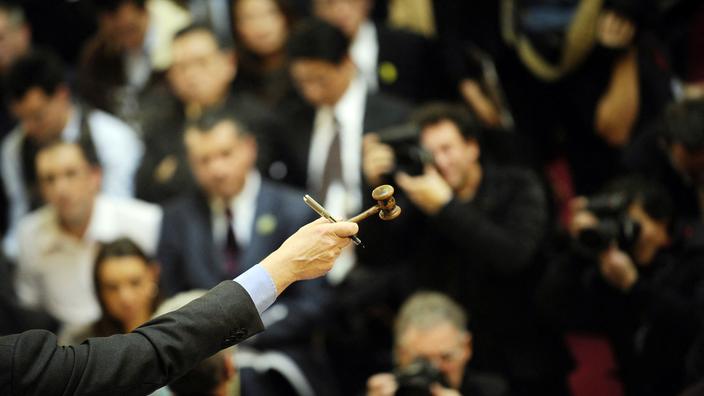Will the new anti-money laundering regulations get the better of the culture of secrecy deeply rooted in the art market?
In the community, it defends body and goods old habits of discretion that promote transactions.
Read also: Terrorism, the art market ... the heyday of financial crime
Wealthy collectors have always valued confidentiality, which is also part of the mysterious universe of auction houses.
When a Botticelli was auctioned last month for $ 92 million at Sotheby's in New York, it was speculated that the buyer was a Russian oligarch, as the offer was made by an adviser to wealthy Russians.
Read also: Art market, how to invest with confidence
But the reality is not so simple, remarks Scott Reyburn, specialist journalist for the podcast
The Week in Art
: “
Sometimes, very fortunate collectors appeal to bidders whose names evoke such or such nationality… to guarantee their own anonymity and cover their tracks
”.
Today, regulators in Europe and the United States want to put an end to the practice of secrecy, which also represents a boon for criminal networks.
New anti-money laundering regulations stipulate that art and antiques dealers in the UK and EU must now inform the true beneficiaries of their sales.
The U.S. Congress has approved similar legislation that could come into effect by 2022.
Art dealers defend their ethics
Some high-profile cases of the past decade have served to justify this tightening of the screws: like when Brazilian banker Edemar Cid Ferreira bought a Basquiat for $ 8 million and then shipped it to a New York storage facility with false papers. customs valuing the work at $ 100.
But some art dealers complain that they are systematically portrayed as bait for criminal circles.
“
The difficulty,” explains Marion Papillon, president of the National Committee of Art Galleries, “is that the regulatory authorities tell us that we do not denounce enough people.
We explain to them that we do not denounce them because we have not done business with them
”.
“
As soon as you feel something a little fishy, you end the relationship.
It is very difficult to explain
"to the French anti-money laundering office Tracfin, which would like"
to go to the end of the transaction so that we can denounce
".
Art dealers also fear negative financial impact, with secrecy surrounding the identity of their clients being their most valued asset.
“
It's a very tough environment
,” observes Tom Christopherson, consultant for Bonhams auction house in London: “
As soon as something sells for a high price, in the seconds that follow the whole art market will seek to find out who was the bidder
”.
Additional costs add up, as small independent galleries have to conduct background research on their clients, as if they were banks.
“A
lot of the small volume traders know their customers, but they probably don't have the resources to document this research.
This environment is not good for bureaucracy,
”said Tom Christopherson.
criminals favor anonymous online transactions
From London to Paris, gallery owners also argue that regulators are investigating in the wrong places, and that criminals will favor anonymous online transactions.
However, most of the Western art market admits that the heyday of the confidential private club is over.
Knowing also that public opinion will not cry over the fate of rich collectors who will lose their anonymity.
With the new regulations, how will these old school merchants adapt?
One possibility, says Amy Whitaker, an art market specialist at New York University, is that they are using technologies like blockchain to "help
continue to ensure privacy while keeping track of purchases
."
But this requires a cultural revolution in a sector where “a
lot of people are still printing their emails,
” she notes.
Merchants might prefer to opt for sales on the sly between old acquaintances than to face a bureaucratic headache.
"
We end up with on the one hand an incentive to develop a technology worthy of science fiction and on the other the reality of two people who continue to negotiate their business around a Spritz
", sums up Amy Whitaker with humor.

